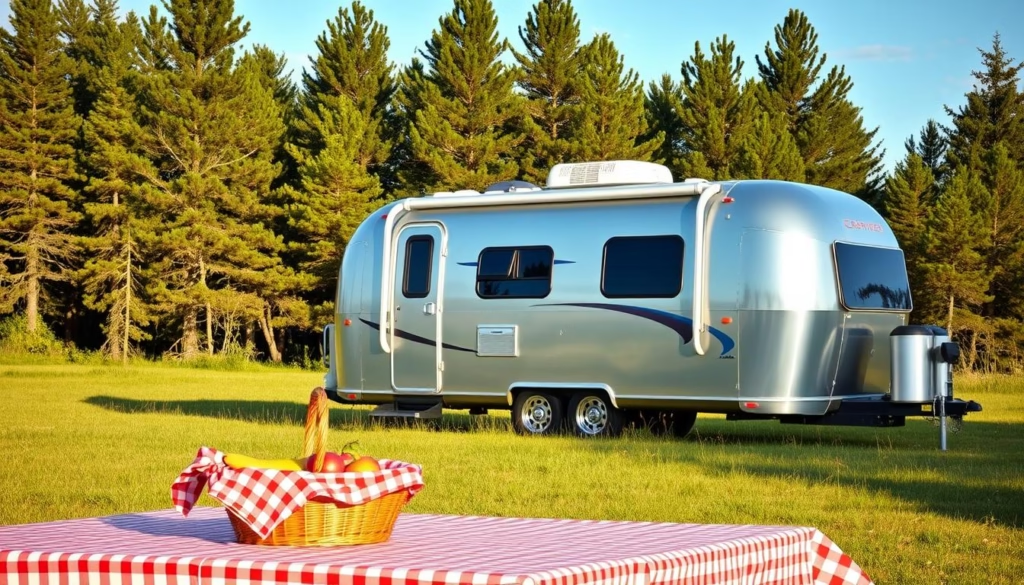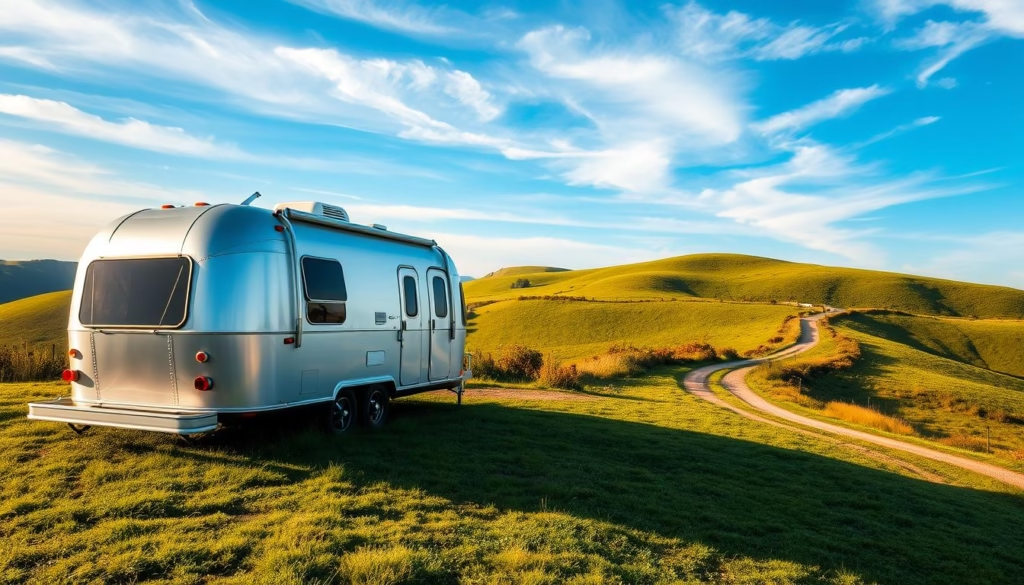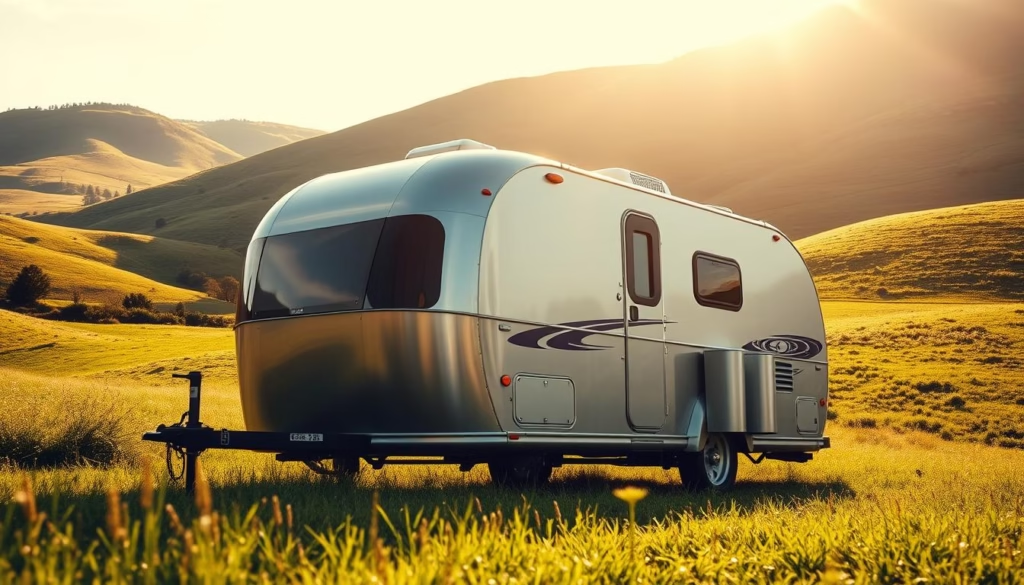What really protects your rig: a legal requirement or smart planning? Many owners assume the answer is simple. The truth mixes state law, tow vehicle rules, and lender demands.
Because a travel trailer is not motorized, most states tie liability to the tow vehicle’s auto policy. That means, on the road, bodily injury and property damage usually fall under the towing vehicle.
But, if you finance or lease a travel trailer, lenders often require comprehensive and collision to protect their lien. A standalone trailer policy focuses on physical damage—theft, vandalism, fire, weather, animal strikes, and crashes.
Expect exclusions such as wear and tear, mold, rot, and delamination. Premiums vary by RV type, usage, storage, driving record, and claims history. You can obtain coverage online, by phone with a licensed rep, or through a local agent.
Key Takeaways
- Do travel trailers need insurance: the short answer for U.S. owners today
- How to decide if you need trailer insurance right now
- What travel trailer insurance may cover—and what it won’t
- Auto and home insurance vs. dedicated trailer insurance: filling the gaps
- Costs, pricing factors, and how to get coverage for your trailer
- Conclusion
- FAQ
- Liability while towing typically attaches to your tow vehicle’s auto policy.
- Financed or leased units usually require comprehensive and collision.
- Trailer policies cover physical damage but exclude wear, mold, and delamination.
- Costs depend on RV type, use, location, and driving/claims history.
- Compare online quotes, call a licensed rep, or work with a local agent.
- State rules and vehicle setup can change what coverage you actually need.
Do travel trailers need insurance: the short answer for U.S. owners today
In most U.S. states, liability for a crash while towing rests with your tow vehicle’s auto policy rather than a separate trailer policy.
Where liability usually sits
Liability for bodily injury and property damage on the road typically lives on the tow vehicle’s policy. Motorhome owners face different rules: nearly every state requires state-minimum liability on the motorhome itself.
When lenders require extra coverage
If you finance or lease a unit, a lender will commonly demand comprehensive and collision on the asset. This protects the lender’s collateral until the loan is paid off.
- Comprehensive coverage — loss from weather, fire, theft, vandalism, or animal impact.
- Collision coverage — damage from crashes, rollovers, or hitting objects.
- Even if a separate policy is not required, many owners buy one to fill gaps in their auto policy.
| Coverage Type | What It Covers | Typical Trigger |
|---|---|---|
| Liability | Bodily injury, property damage | Towing vehicle at-fault accident |
| Comprehensive | Theft, fire, storm, vandalism, animal | Non-collision events |
| Collision | Impact, rollovers | Accidents on road or campsite |
Tip: Verify any change in lender, registration, or tow vehicle to confirm your state and loan requirements.
For a quick primer on coverage options, see our guide to trailer insurance basics.
How to decide if you need trailer insurance right now
The right protection depends less on rules and more on your usage, loan terms, and storage risks.

If your travel trailer is financed or leased: Lenders typically require comprehensive and collision. Check loan documents and confirm the lienholder is listed on the policy.
If your trailer is paid off but you camp frequently or store it offsite
Frequent use, offsite storage, or unsecured lots raise theft and storm exposure.
Consider comprehensive to cover non-collision perils, and add collision if highway miles are high.
If you’re a full-time RVer versus a weekend traveler
Full-time RVers often benefit from specialized full-time policy options that treat the unit as a primary residence.
Weekend campers may prefer simpler coverage focused on physical damage and personal property.
If you cross multiple states with varying requirements
Confirm that your tow vehicle’s auto liability meets each state’s minimums and that your trailer’s physical damage coverage follows you on the road.
“Review your policy yearly—after moves, upgrades, or changes in storage—to keep protection aligned with real-world risks.”
- Document condition and upgrades with photos and receipts.
- Balance deductible levels against your budget.
- For lender rules and checklist, see loan-required coverage.
What travel trailer insurance may cover—and what it won’t
A clear view of what policies cover helps owners prioritize protection and avoid surprises.

Comprehensive coverage: theft, vandalism, fire, weather, and animal damage
Comprehensive coverage protects against non-collision perils. That includes theft, vandalism, wildfire, storm damage, and animal strikes that dent or puncture your unit.
These coverages help pay for repairs or replacement when weather or crime causes loss.
Collision coverage: crashes, rollovers, and impact with objects
Collision coverage repairs or replaces the trailer after a crash with another vehicle, a fixed object, or a rollover. It applies on highways and in tight campsites alike.
Liability nuances
Liability for on-road incidents typically sits with the towing vehicle’s auto policy. Trailer policies usually exclude road liability, so confirm which auto policy covers bodily injury and property damage.
Optional protections and common exclusions
Optional add-ons can include vacation liability at campsites and extra property protection for high-value gear.
Common exclusions are general wear and tear, mold, fungi/rot, and delamination repairs. Keep maintenance records to avoid denied claims when small wear becomes major damage.
| Type | What it may cover | When it triggers |
|---|---|---|
| Comprehensive | Theft, vandalism, fire, storm, animal strikes | Non-collision events while parked or stored |
| Collision | Impact repairs, rollovers | Accidents on road or campsite |
| Optional | Vacation liability, contents protection | Incidents at camp or theft of personal property |
“Review deductibles and limits so your coverage may perform as expected after a loss.”
Auto and home insurance vs. dedicated trailer insurance: filling the gaps
Liability on public roads usually follows the tow vehicle, while the trailer’s physical damage sits elsewhere. That split explains why many owners hold two different policies.

On the road: when your auto policy may cover the trailer
Your auto policy often provides liability for incidents while towing. It typically handles bodily injury and property damage claims that occur on the road.
But, that policy will not repair the trailer’s body after a collision. For that, a dedicated coverage travel trailer policy with collision and comprehensive is needed.
Parked or stored: why vandalism or storm damage may not be covered
Homeowner policies sometimes extend limited protection for property on your land. However, they rarely respond to offsite losses at campsites or storage lots.
Broken windows from vandalism or hail while parked at a state park usually require a trailer policy or a specific endorsement. Vacation liability can help with campsite property claims, but limits and exclusions vary.
- Coordinate limits and deductibles between auto and trailer policies to avoid gaps.
- Review “other structures” and “personal property off premises” language in home policies.
- If unsure, consult a specialist or read trailer coverage basics at trailer coverage basics.
“Match your coverage to where you park, store, and drive — that determines real-world risk.”
Costs, pricing factors, and how to get coverage for your trailer
Rate quotes reflect the trailer’s value, where you park it, and the coverages you select.
What affects your rate
Vehicle and type: Make, model, age, and whether it’s a travel trailer or fifth wheel change the cost. Higher replacement value raises premiums.
Usage and storage: Annual miles, trip frequency, and indoor versus outdoor storage affect risk and costs. Long drives or outdoor storage in high-risk zones push rates up.
Driver and claims history: Clean records lower the cost. Prior losses or frequent claims increase the premium.
How to buy coverage today
- Start an online quote—enter VIN, specs, storage address, and typical travel radius.
- Call a licensed rep for help customizing limits and deductibles.
- Work with a local independent agent for in-person advice and bundling options.
| Factor | Impact on cost | Tip |
|---|---|---|
| Trailer type & age | Higher for newer or hard-to-repair units | Document upgrades and receipts |
| Chosen coverages & deductibles | More coverages raise premiums; higher deductibles lower them | Balance premium vs out-of-pocket |
| Storage & location | Urban or flood-prone areas increase cost | Consider secured indoor storage for discounts |
Note: Lenders commonly require comprehensive and collision on financed units. Verify lienholder details to avoid force-placed coverage.
“Shop multiple options, check discounts, and reassess at renewal after moves or upgrades.”
Conclusion
Protecting your camper means pairing the right auto liability with dedicated physical-damage coverage.
Liability on the road usually follows your tow vehicle, while a trailer policy handles theft, vandalism, storm and collision damage. Lenders often require comprehensive collision until a unit is paid off.
Remember exclusions such as wear, mold, and delamination. Homeowner policies rarely cover losses offsite, so dedicated protection fills gaps for property left at campsites or storage lots.
Before your next outing, confirm auto limits, verify policy deductibles, and document serial numbers and photos. For a quick primer, see our travel trailer insurance guide.
FAQ
Do travel trailers need insurance coverage?
Most U.S. owners should carry some form of coverage. State laws often require liability for the tow vehicle, and lenders typically demand comprehensive and collision when a trailer is financed. Even if not required, a dedicated policy protects against theft, vandalism, storm damage, and liability gaps that auto or homeowners policies may not cover.
When is liability required and where does it actually sit?
Liability for damage or injury caused while towing usually sits with the tow vehicle’s auto policy. Many states mandate minimum liability limits for the vehicle that tows the trailer. That policy typically addresses bodily injury and property damage while you’re hauling the trailer, but limits and exclusions can leave gaps if the trailer causes harm while detached or at a campground.
When will a lender require comprehensive and collision on a trailer?
If you finance or lease a trailer, the lender or lessor usually requires full physical damage coverage—comprehensive and collision—until the loan is paid. This protects the lender’s interest against theft, fire, weather, or crash damage. The borrower must list the lender as loss payee on the policy.
How should I decide if I need trailer coverage right now?
Consider ownership status, usage, and risk. If the trailer is financed, coverage is almost always required. If you camp often, store it offsite, or tow frequently, dedicated coverage reduces financial risk. Full-time RVers generally need broader protection than occasional weekend users. Also check insurance rules in states you visit—requirements vary.
If my travel trailer is financed or leased, what coverage matters most?
Lenders focus on comprehensive and collision to cover physical damage. You should also carry agreed-value or replacement-cost options if offered, plus a deductible level that fits your budget. Make sure the lender is listed as lienholder or loss payee on the policy.
If my trailer is paid off but I camp frequently or store it offsite, what should I buy?
Even with no lender, consider comprehensive coverage for theft, fire, vandalism, and weather. Add optional coverages such as contents protection for gear, and vacation liability for campsite incidents. If stored offsite, confirm the storage facility’s liability limits and consider a policy that covers theft or damage while parked there.
How does coverage differ for full-time RVers versus weekend travelers?
Full-time occupants need broader protection: higher liability limits, full-timer endorsements for personal property and living expenses, and roadside assistance that covers extended travel. Weekend users may opt for basic physical damage and limited liability if they stay close to home. Usage affects premiums and available endorsements.
What if I travel across multiple states with different insurance rules?
Your auto policy generally follows you across state lines, but minimum liability limits and specific coverages vary by state. Verify that your limits meet or exceed the highest requirements in states you visit and consider an umbrella policy for extra liability protection when traveling long distances.
What does comprehensive coverage for a trailer include?
Comprehensive covers non-collision events: theft, vandalism, fire, wind, hail, flood, falling objects, and animal strikes. It typically pays to repair or replace the trailer minus your deductible and may include glass or equipment protection depending on the carrier.
What does collision coverage protect against?
Collision pays for damage when the trailer hits or is struck by another object—crashes, rollovers, or impact with guardrails and barriers. It applies whether you’re towing or the trailer is parked and struck by a vehicle, subject to policy terms and deductibles.
Why do trailer policies sometimes exclude liability and how does auto insurance apply?
Many trailer policies focus on physical damage and exclude third-party liability because primary liability typically falls under the tow vehicle’s auto policy. If the trailer causes injury while detached or at a campsite, your homeowners or a trailer-specific liability endorsement may be necessary. Review both auto and homeowners policies to identify gaps.
What optional protections should I consider for a trailer?
Consider vacation liability for injuries at campsites, contents coverage for personal gear, emergency expense coverage for roadside assistance, and replacement-cost or agreed-value endorsements. Specialized add-ons include full-timer endorsements and coverage for awnings, solar, and aftermarket equipment.
What common exclusions should I watch for?
Typical exclusions include general wear and tear, maintenance issues, mold, fungal rot, delamination, mechanical breakdown, and intentional damage. Flood and earthquake may require separate endorsements. Read policy exclusions carefully to avoid surprises.
When might my auto or home policy cover trailer losses and when will it not?
Your auto policy often covers liability and may cover the trailer while attached and being towed. Homeowners policies may cover personal property stored inside the trailer and certain liability at the campsite. Neither policy reliably covers physical damage to the trailer itself—dedicated trailer coverage or an RV policy fills that gap.
If my trailer is parked or stored, why might vandalism or storm damage not be covered?
Auto policies typically limit physical-damage coverage to incidents occurring while the vehicle is being used. If the trailer is stored, comprehensive coverage on a dedicated policy is usually required to cover theft, vandalism, or storm damage. Storage location and security can affect eligibility and premiums.
What factors affect trailer insurance costs?
Rates depend on trailer type (fifth-wheel, bumper-pull, pop-up), age, value, usage, storage, location, your claims history, and chosen deductibles and limits. Add-ons like contents, vacation liability, and replacement-cost endorsements increase premiums. Insurers also consider theft and weather risk in your area.
How can I buy coverage today?
Get quotes online from carriers like Progressive, State Farm, or Allstate; call a licensed representative; or work with a local independent agent to compare options. Provide VIN, mileage, storage details, and usage patterns to receive accurate pricing and identify proper endorsements.